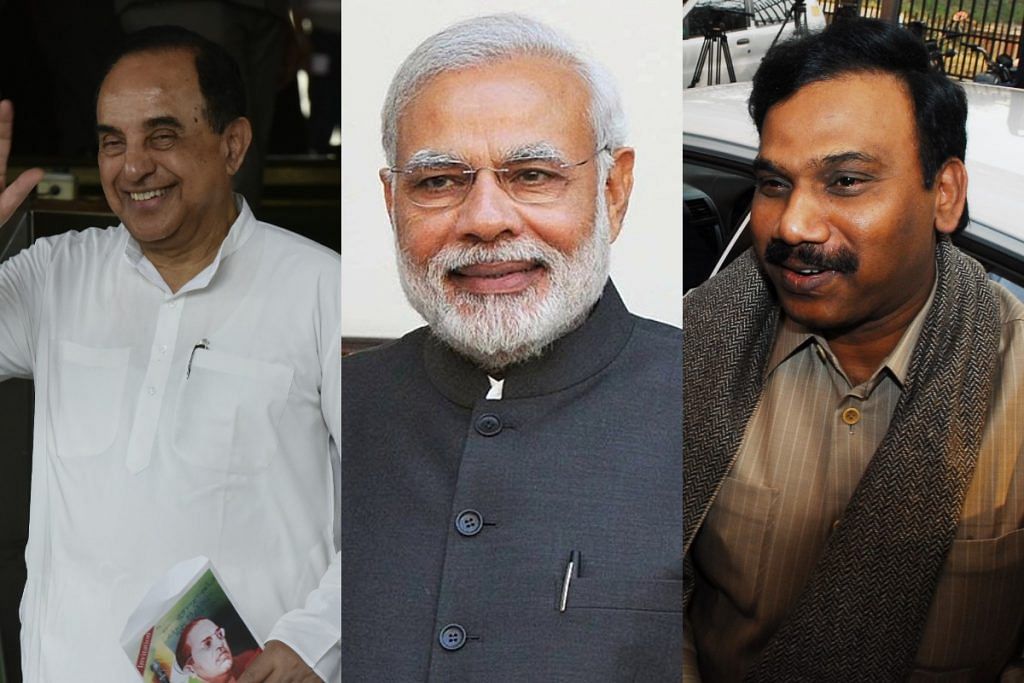If a court holds demonetization policy to be procedurally irregular, causing a loss to GDP and benefiting some private digital payment companies, would Narendra Modi be declared corrupt?
To paraphrase Mark Twain, a sensational allegation can travel half way around the world while facts is putting on its shoes. The more outrageous the claims are, like lakhs of crores in presumptive loss, the news travels faster, wider and deeper.
There was a deep prejudice manufactured into the minds of public on the basis of some back-of-the-envelope calculations done by a Comptroller and Auditor General (CAG). I don’t want to say much further about this CAG, who has smugly titled his autobiography as ‘Not Just an Accountant’. Clearly, not. In any case, I wish him a good tenure as the Honorary Advisor to the Ministry of Railways and as Chairman of the Banks Board Bureau and any other position that may come his way as gratitude for being more than an accountant.
However, some ink needs to be spilled about the manufacturers of the 2G “scam”. Leading the pack is the self-proclaimed brain behind the 2G case and erstwhile Janata Party leader: Subramanian Swamy. In his interview yesterday (21.12.2017), he said that he would ask the Prime Minister to constitute a “War-like Council” and purge the Finance Ministry. Swamy merged his Janata Party with the Bharatiya Janata Party in August 2013 and was subsequently nominated as a member of Rajya Sabha in 2016.
Another character who emerged out of the shadows during the early stages of the 2G case was Aseervatham Achary – a man who had spent a decade or so working in A. Raja’s ministerial office. Achary quit the office of Raja around 2008 and was deputed back to his parent governmental office. Achary presented himself as a ‘star witness’ and deposed against his former boss and provided some of the most entertaining courtroom moments. Today, Achary is a part of the BJP’s “Strategic Action Committee”.
There are others like Kiran Bedi who positioned themselves as anti-corruption crusaders in 2011 — only to be rewarded by BJP with tickets for assembly election and candidate-ship for Chief Minister; and after failing to win the seat, was sent as Lieutenant Governor to Pondicherry. The common thread that connects all these people — other than the fact that they’ve all become BJP office-bearers — is that they had played crucial roles in building a perception that there was a massive “scam”.
The real scam in all this is that the allocation of spectrum in 2007 was projected as a scam. The entire issue was prejudged based on bare hunches, incomplete information and corridor rumours. It was declared a scam on national media, in parliament and people were led to believe that there was one. To quote the judgment of Special Judge OP Saini, in paragraph 1814: “Thus, some people created a scam by artfully arranging a few selected facts and exaggerating things beyond recognition to astronomical levels”.
Emboldened, the politicians sitting in the opposition benches took the liberty of plunging to new depths in political discourse. The minister was referred to as “Spectrum Raja” and the entire issue was called the “2G scam”. Was the issue not prejudged by various institutions of this country, including the media? How could Raja get a free and fair trial after being branded as “Spectrum Raja” in television tickers? Would all those who used the term “2G scam” today reflect on the 1552 page judgment in the CBI case and say whether they have not prejudged the issue?
It is a sad state of affairs that the spokespersons of BJP, including eminent lawyers, have reacted to the verdict by saying it is not a “certificate” and quoted a Supreme Court order from 2012 on the issue of allocation of licenses.
There is simply no legal basis to these arguments. In a writ petition under Article 32 such as the case which was decided by the Supreme Court in 2012, corruption or criminality cannot be determined. In fact, a writ petition is barred from adjudicating on ‘disputed facts’. It is another aspect that A. Raja was never given an opportunity to file a counter affidavit or become a party to the proceedings in 2012 when his decisions were the subject matter of the writ.
May I also remind the BJP that everyday, hundreds of government tenders and policy decisions are called into question before the courts of law and subsequently, held to the capricious, arbitrary and ultra vires? Does this mean all such cases, including those that have been decided in the last three years lead to the inference of widespread corruption or scams? Does the BJP now say, by the same logic, that if a constitutional court is to hold demonetization policy to be procedurally irregular, having caused a loss of 2% to the Indian Gross Domestic Product and benefitted some private digital payment companies, then Narendra Modi would be declared corrupt?
Manuraj Shunmugasundaram is spokesperson, Dravida Munnetra Kazhagam, and an advocate in Madras High Court.
